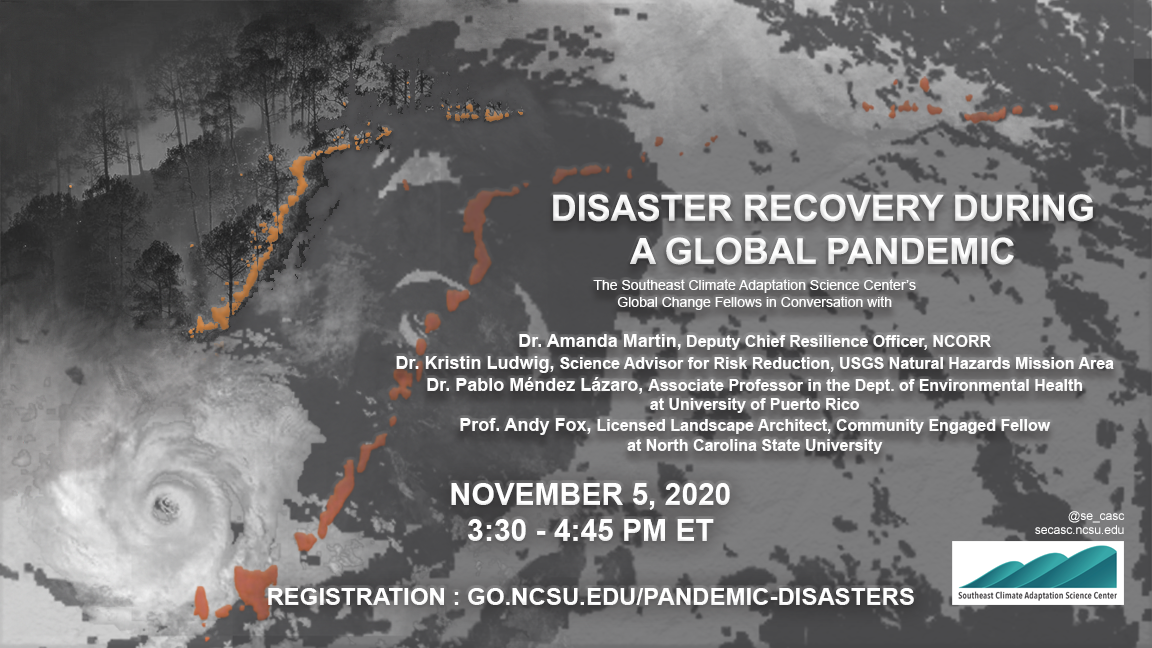Global Change Seminar: Experts Emphasize Communication and Community Empowerment in Disaster Recovery

This post, written by Global Change Fellows Rebecca Asser and Ambar Torres Molinari, summarizes the second seminar in the Fall 2020 Global Change Seminar series, Disaster Recovery During a Global Pandemic, held on November 5, 2020. Organized and hosted by the 2020-21 cohort of SE CASC Global Change Fellows, the discussion was moderated by Global Change Fellows, Greta Easthom and Jin Bai.
View a recording of the panel discussion.

Panelists :
- Andy Fox: Professor and community engaged faculty fellow in the Center for Geospatial Analytics at NC State. Additionally, he is a licensed landscape architect and a founding co-director of the Coastal Dynamics Design Lab.
- Pablo Méndez Lázaro: Associate Professor in the Department of Environmental Health at the University of Puerto Rico, Graduate School of Public Health. He has conducted research addressing climate and weather extreme events impacts on public health and resilience.
- Kristin Ludwig: Science Advisor for Risk Reduction at US Geological Survey Natural Hazards Mission Area. She is part of the Department of the Interior Strategic Sciences Group, a multidisciplinary task force that supports decision making during environmental crises.
- Amanda Martin: Deputy Chief Resilience Officer for the North Carolina Office of Recovery and Resiliency. She has devoted to building resilience in ways that advance economic prosperity, strengthen housing options, and celebrate cultural and natural heritage.
As the world finds itself in the unique position of multiple crises, the Global Change Fellows gathered a multi-disciplinary panel from across the continental United States and Puerto Rico to discuss the challenges and opportunities when addressing climate change, disaster recovery, and a global pandemic.
Through an open discussion guided by questions prepared by the Global Change Fellows and audience members, panelists agreed that COVID-19 had further exposed the need for communication and that long-term interdisciplinary collaboration with communities would be necessary as we grapple with a changing climate. The panelists have a large range of experiences with disaster recovery, including addressing public health in the aftermath of earthquakes and hurricanes, developing housing and resilience strategies after Hurricanes Matthew and Florence, as well as organizing multidisciplinary teams in response to volcanic eruptions. With their varied experiences, the panelists were able to decipher major learning opportunities of the current times. Throughout the pandemic, the speakers noted that accurate and relevant information has been hard to come by, and this can similarly happen during disaster recovery. The speakers emphasized the need to empower communities with the necessary resources, guidance, and connections to allow them to choose their necessary routes towards resiliency. They also mentioned the ways in which resilience and disaster recovery may take a different form for each community, and how one plan is not a “one size fits all” solution. The panelists recognized that disaster management might take on a different form in the current pandemic, as COVID-19 is not just a regional challenge but also a global one.
- Categories:
